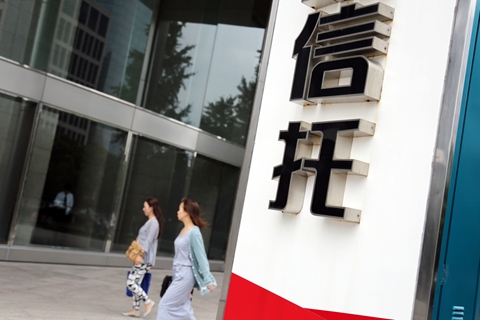‘Channeling’ Business Thrives in China’s Trust Industry Despite Curbs

Despite a government clampdown, China’s trust industry still relies heavily on easy money by “channeling” funds to borrowers often restricted from the formal lending system.
In the three months ended Dec. 31, total trust assets managed by 68 Chinese trust companies grew by 29.81% year-over-year to 26.25 trillion yuan ($4.17 trillion), the China Trustee Association (CTA) reported on Wednesday.
Growth in the fourth quarter accelerated by 5.8 percentage points from a year earlier, the industry body’s data showed.
Fueling the expansion is the thriving business in which trust firms act as intermediaries to help facilitate lending for banks, other financial institutions or individual investors. In a typical example, a bank collects money from its customers by selling wealth-management products and then invests the funds into trust products, which funnel the capital to borrowers that are usually roped out of the formal lending system, such as local government financing vehicles and real-estate developers. Banks bear the risk, while trusts simply channel the money.
The channeling business accounted 15.65 trillion yuan, or 59.62% of total trust assets, up from 55.66% in the third quarter, the association said.
Regulators have been trying to curb the channeling business as concerns mounted about the rampant growth of “shadow banking,” which allows banks to bypass lending rules and fuels the rapid buildup of corporate debt.
In December, the China Banking Regulatory Commission (CBRC) issued a notice to extend its oversight to “property trust products,” in which banks entrust their existing assets or property rights to trust companies. These products can be used to facilitate channel financing.
In the face of stricter scrutiny, some trust companies have taken action to control the size of their channeling business. Caixin has learned that several companies have either halted their channeling business or promised to stop after existing products mature.
In late December, Citic Trust, one of the largest trust companies, said it will slim down its channeling business this year, or at least not expand it, and will try to negotiate an early termination of channeling contracts with other financial institutions. In January, China Fortune International Trust Co. issued a statement saying it will not expand its channeling business this year.
Some experts expect the policy impact should be reflected in the first quarter’s trust assets data.
Amid concerns over debt-driven investments, regulators have also tightened scrutiny on trust firms’ other businesses, such as real-estate investment trusts.
In its December notice, the CBRC reiterated that funds collected by bank trust products cannot be invested in real estate, government financing vehicles or the stock market “in an illegal way.”
Real-estate investment still accounted for a significant part of trust funds. As of the end of the fourth quarter, trust companies poured 2.28 trillion yuan into real-estate investments, a nearly 60% increase year-over-year and a 10.50% increase from the prior quarter. Real estate investment accounted 10.43% of trust industry assets, up by 0.41 percentage points from the third quarter, CTA data showed.
A report by the Trust and Wealth Management Research Institute of Southwestern University of Finance and Economics predicts that the growth in real-estate investment by trust companies will slow down in the future.
The CTA’s data also showed the quality of assets under management improved in the fourth quarter. The ratio of nonperforming assets dropped to 0.5% from 0.58% a year ago, the association said.

- 1Cover Story: China Carves Out a Narrow Path for Offshore Asset Tokenization
- 2Drownings Shake Chinese Enthusiasm for Travel to Russia
- 3China Business Uncovered Podcast: A $15 Billion Bitcoin Seizure and the Fall of a Cybercrime Kingpin
- 4Over Half of China’s Provinces Cut Revenue Targets
- 5Li Ka-Shing’s Port Empire Hit by Forced Takeover Amid Panama Legal Dispute
- 1Power To The People: Pintec Serves A Booming Consumer Class
- 2Largest hotel group in Europe accepts UnionPay
- 3UnionPay mobile QuickPass debuts in Hong Kong
- 4UnionPay International launches premium catering privilege U Dining Collection
- 5UnionPay International’s U Plan has covered over 1600 stores overseas






